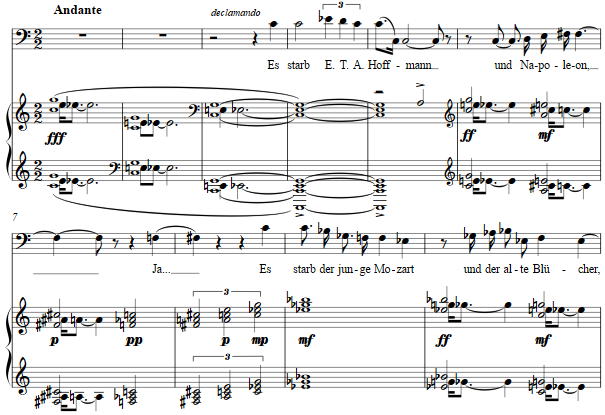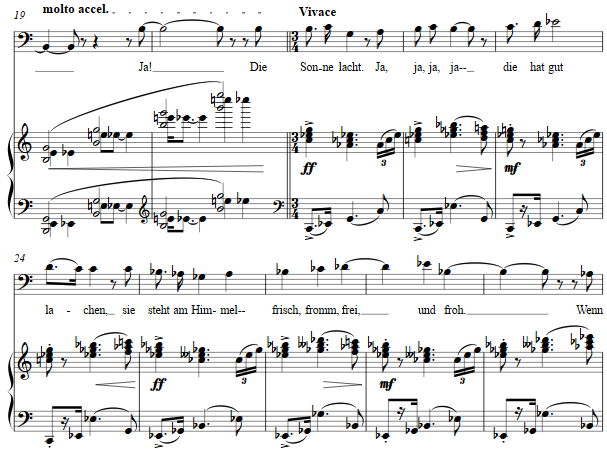Music and Texts of GARY BACHLUND
Vocal Music | Piano | Organ | Chamber Music | Orchestral | Articles and Commentary | Poems and Stories | Miscellany | FAQs
Pessimismus-lied - (2016)
Fred Endrikat
for baritone and piano
Es starb E. T. A. Hoffmann und Napoleon,
es starb der junge Mozart und der alte Blücher,
es starb der Große Kurfürst und Pipin des Kleinen Sohn,
kurzum: man ist sich seines Lebens nicht mehr sicher.
Die Sonne lacht. Ja, ja – die hat gut lachen,
sie steht am Himmel – frisch, fromm, frei und froh.
Wenn ich die Sonne wär' – ich würd' es auch so machen.
Mir geht mit Grundeis leider der Popo.
Der Flieder blüht. Ja, ja – der hat gut blühen,
ihn schützt der Zaun und eine Gartentür.
Er ist geschützt vor Ochsen und den Kühen.
Ich stehe außerhalb – und wer schützt mir?
Die Amsel lockt. Ja, ja – die hat gut locken,
sie sitzt im Baum, es jubelt fern und nah.
Es jubeln alle Kirchen, Kuh- und Käseglocken:
Der Lenz und der Gerichtsvollzieher sind da.5 pages, circa 3'50"
Fred Endrikat
The text is two poems of Fred Endrikat (1890-1942), the first titled "Pessimismus" comprises the first strophe above, and the second titled "Pessimist im Lenz" is the three remaining strophes.
Long dead: E. T. A. Hoffmann und Napoleon,
also the young Mozart und the old Blücher,
and too, Count Brandenburg, and Pippin, Martel's son,
in short: of his life, man himself is no more sure.
The sun guffaws. Yes, yes - it laughed aloud,
It glides above - free, fresh, calmly brilliant skied.
If I were the sun -- I would do me up proud,
Rather like the bilge from out my backside.
The lilac blooms. Yes, yes, in blooms on boughs,
And is guarded by fence and garden gate.
It is protected from the oxen and cows.
I stand outside -- who defends against my fate?
The blackbird calls, Yes, yes, it called to lovers,
And sits on branches, singing far and wee.
It cheers churches, cow bells and cheese covers:
Spring and the customs police are as drear as can be.
rhymed paraphrase of the composer
The opening is a litany of some named dead: E. T. A. Hoffmann (1776-1822), Napoléon Bonaparte (1769-1821), Franz Peter Schubert (1797-1828), Gebhard Leberecht von Blücher, Fürst von Wahlstatt (1742-1819) and Prussian Generalfeldmarschall who led against Napoléon, Friedrich Wilhelm von Brandenburg (1620-1688), and Pippin, the son of Charles Martel, also know as Pippin the Younger, Pippin III, Pippin the Short and Pippin the Small (714-768). Some relationships seem accidental, though it was Blücher who was first defeated by Napoléon and then who led the final battles to the final defeat of Bonaparte and the French army at Waterloo.
Musically, the harmonies move quickly from major to minor, in parallel motion in octaves in the accompaniment as the text is declaimed.
The three remaining strophes are set in waltz time, the parallel motion of the distantly related minor triads outlining tonal regions nonetheless. A return to the opening samples the litany before ending with an ironic last waltz gesture which fades into the quiet.
The score for Pessimismus-lied is available as a free PDF download, though any major commercial performance or recording of the work is prohibited without prior arrangement with the composer. Click on the graphic below for this piano-vocal score.


